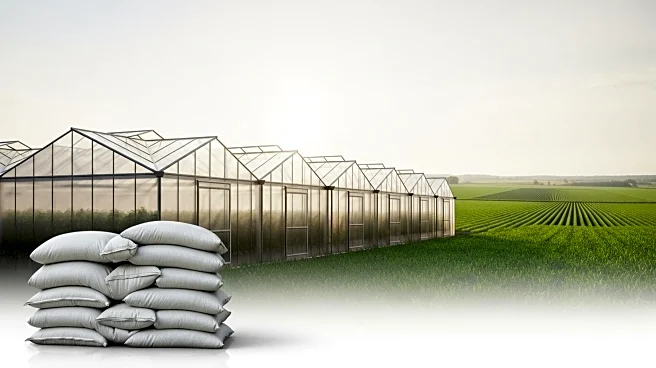What's Happening?
The global agricultural sector is facing a significant challenge due to an ammonia shortage in 2025. Ammonia, a key component in nitrogen-based fertilizers, is crucial for modern farming practices. The shortage is attributed to several factors, including energy price volatility, supply chain disruptions, and increased demand from agriculture and biofuels. This shortage is expected to reduce crop yields, increase food prices, and impact global food security. The shortage is particularly affecting almonds and chicken production, with potential yield reductions of up to 30% for almonds and a 15% drop in chicken meat production.
Why It's Important?
The ammonia shortage has far-reaching implications for global food security and agricultural productivity. As ammonia is essential for producing nitrogen fertilizers, its scarcity could lead to reduced crop yields and increased food prices, affecting food availability and nutrition worldwide. The shortage also highlights the vulnerability of global supply chains and the need for technological and policy adaptations to ensure agricultural resilience. The situation underscores the importance of sustainable agricultural practices and the development of alternative solutions to mitigate the impact of such shortages.
What's Next?
To address the ammonia shortage, stakeholders are encouraged to adopt technological innovations and sustainable practices. This includes the production of green ammonia using renewable energy, precision agriculture, and blockchain-based supply chain traceability. Governments and industries may need to invest in new ammonia production facilities and diversify supply chains to build resilience against future disruptions. Additionally, policy responses at local, regional, and global levels will be crucial in supporting these efforts and maintaining food system stability.
Beyond the Headlines
The ammonia shortage also raises ethical and environmental considerations, as it highlights the need for sustainable agricultural practices and the reduction of dependency on fossil fuels. The situation may drive long-term shifts in agricultural policies and practices, promoting the adoption of green technologies and more resilient supply chains. The shortage also emphasizes the importance of global cooperation and coordination in addressing food security challenges and ensuring equitable access to resources.










